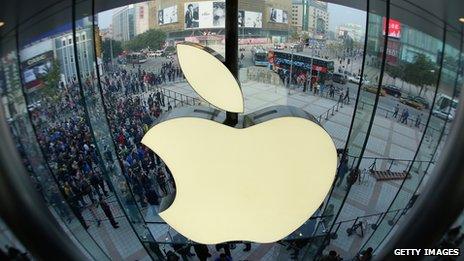Is Apple's tax avoidance rational?
- Published
- comments

Crikey.
That was the word that ricocheted around my skull as I read the US congressional report into Apple Inc's tax arrangements.
Here are a few choice quotes:
"Apple Inc established an offshore subsidiary, Apple Operations International, which from 2009 to 2012 reported net income of $30bn, but declined to declare any tax residence, filed no corporate income tax return and paid no corporate income taxes to any national government for five years."
It is as though a bunch of alien techies arrived from Mars, sold us $30bn (£19.6bn) worth of smartphones and laptops, and then took all the moolah up to the stratosphere, where they simply circled the earth.
Also, another Apple affiliate, based in low-tax Ireland, Apple Sales International, buys Apple's finished products from a manufacturer in China and then re-sells them "at a substantial markup" to other parts of Apple's empire, and retains the profits.
So Irish-based Apples Sales International generated around $74bn (£48.5bn) in profits but "may have paid little or no income taxes to any national government on the vast bulk of those funds".
According to the senators on the Permanent Subcommitte on Investigations, Apple transferred offshore into low-tax countries the economic rights to its intellectual property - its valuable and usually patentable knowhow - with the result that it avoided around $10bn (£6.5bn) of US tax every year (what the senators characterise as $44bn, or £29bn, of US tax avoidance over the past four years).
What is the point of all this? Well the senators point out that Apple has continued to accumulate vast amounts of cash in places other than the US, and those cash holdings now exceed an eye-popping $102bn (£67bn).
Why does any of this matter?
Well it is part of a broad trend of multinationals paying a much smaller proportion of public sector costs in all the world's developed economies.
In the US, for example, corporate tax generated 32.1% of all federal taxes in 1952. Today that proportion has fallen to a puny 8.9%.
Similar trends of corporate taxes generating a shrinking share of the state's costs hold in the UK.
And at a time when the burden of government debt in the US, UK and much of Western Europe is rising in a way that many regard as unsustainable, the idea that big companies aren't paying their way becomes more resonant (as if you hadn't worked that out for yourself).
Here's the thing: the word "multinational" may be a bit of a misnomer. The brains that power and generate all that lovely income at a company like Apple - or Google, or Amazon, or Starbucks - are national.
Most of them were born in US hospitals, they went to US schools and universities, they were able to study rather than sitting at home defending their properties with shotguns thanks to American law and order.
And, of course, if the brains in these countries are Indian or British, the same dependence on their mother countries for the conditions that nurtured them would apply.
Which is why, some would argue, the desire of Apple and other multinationals to minimise the taxes they pay in the US, or anywhere for that matter, may be rational for them individually but is bonkers for them collectively - since over time it will erode the very infrastructure of the global economy which allows them to thrive.
Here are three other points that matter about all this.
First, hoarding cash in low-tax centres seems in some ways a bit pointless for publicly owned corporations - in that it creates enormous complications when it comes to getting the cash to its rightful owners, the shareholders.
It is perhaps a bit odd therefore that the investment institutions which own big multinationals have sat idly by for years while all this tax avoiding took place.
Second, the huge noise - on the internet especially - generated by the congressional and parliamentary investigations of tax avoiders is probably not good for brand Ireland.
If the Irish state is seen as perhaps the main facilitator of Apple and its ilk not paying their fair share in the US and UK, consumers and politicians in the rest of the world may not have quite such warm feelings towards any product or service badged Irish.
Finally, there must be a risk for Apple that the popularity of Apple's products will be damaged by the senatorial charge that it generates all this tax-free cash which then sits in its vaults and does nothing.
Surely the essence of Apple's brand is that its products make all of us more productive, in play or work. So for Apple to be seen as the world's greatest accumulator of cash that seemingly has little productive use may not be adding lustre to its image.